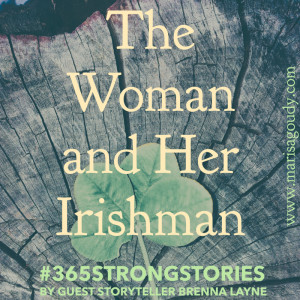
BLOG
The Woman and Her Irishman by Guest Storyteller Brenna Layne
 Over a century ago, the orphanage burned to the ground, and a chapter of my family's history went up in smoke. With the papers charred to ash, all anyone knew about Timothy Sullivan was what they could remember—that he had been allowed to keep his birth-father's name (an unusual practice at the time) and that he'd been left at the orphanage by a woman with long black hair.
Every year when St. Patrick's Day rolls around, my family retells the stories of our ancestors. Timothy's begins in fire and mystery, but it's the woman I wonder about. The suggestion in the story has always been that she wasn't Caucasian, that some Irish immigrant had taken a Native wife or lover.
Over a century ago, the orphanage burned to the ground, and a chapter of my family's history went up in smoke. With the papers charred to ash, all anyone knew about Timothy Sullivan was what they could remember—that he had been allowed to keep his birth-father's name (an unusual practice at the time) and that he'd been left at the orphanage by a woman with long black hair.
Every year when St. Patrick's Day rolls around, my family retells the stories of our ancestors. Timothy's begins in fire and mystery, but it's the woman I wonder about. The suggestion in the story has always been that she wasn't Caucasian, that some Irish immigrant had taken a Native wife or lover.
Last week, the internet exploded over the release of J. K. Rowling's new series of stories set in North America and heavily featuring Native American mythology viewed through a European lens. Many First Nations people decry Rowling's cultural appropriation, while Harry Potter fans spring to her defense.
I don't know what to think. I've been reading articles about cultural appropriation and trying to understand. There is so much rhetoric on all sides. What I do understand is that stories have power. They tell us who we are, shape the way we locate ourselves in this world, pit us against each other. They bring out the best and the worst in us.
So what does it mean that part of my story is missing? Sometimes I try to imagine all the nameless women who came before me, their faces and loves and lives lost to history. My head spins, and the hugeness of not-knowing threatens to overwhelm me. How do I understand myself if I don't know where I come from?
Stories are tricky, and trickiest of all is that there comes a time when we must begin to write them for ourselves. So I pick up the threads, the floating flakes of ash borne on a century-old updraft, and set out into the wide world to discover who I am.
 Brenna Layne is a writer and mother in the Shenandoah Valley of Virginia, where she chases words, kids, critters, and sunsets.
Brenna Layne is a writer and mother in the Shenandoah Valley of Virginia, where she chases words, kids, critters, and sunsets.
